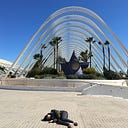You can be famous in San Francisco even if you are a nobody
San Francisco is a place of meritocracy. You will hear lots of crazy stories. Someone without any ML background getting into Google DeepMind by self-studying ML intensely for three months. A 19-year-old sitting next to you makes $1M a year.
The appeal of San Francisco lies in the fact that no matter who you are, as long as you can produce good work, you can be on the stage.
By “good work,” I don’t only mean highly technical work; good ideas are included. For instance, I’m a software newbie. Sitting in a room of researchers, founders, and investors, I feel like there is nothing I can say.
However, when I presented my simple side project at a house hackathon, people noticed it. Those people whom I deeply admire said I’m cool. Whaaaat?
Famous hackers follow me and retweet me, but most importantly, I got into their community. This has unlocked a lot of new experiences. For instance, Alex invited me to an exclusive dinner at the top incubator in SF, where I was amazed by all the product demos.
Alex said that he got free tickets to the latest Google demo as a “creator” because he constantly posts and goes to hackathons. Sasha is staying with people from Latent Space, the most well-known AI newsletter in the Bay Area, if not in the world. Jeremy’s AGI house hackathon has invited Sergey Brin, the co-founder of Google.
Most people think the way to go about your career is by climbing that social ladder or going to company-sponsored events. After exploring all these stuff in SF, I realized that it is completely inefficient and ineffective. Do you think Google employees even have this kind of access to their founder?
If you are in the right community, you can meet really good people. They aren’t just important central hubs in SF; often, they have great qualities that go beyond tech. They are well-educated in philosophy, psychology, economics, and various other fields.
Don’t think of this as a transactional relationship or “networking.” Most people are humble, curious, and supportive. For instance, when I wanted to get rid of my project away, Alex commented and said, “Your mobile here and there is buggy!” So…I had no choice but to flesh out my project. Putting myself out there really helps me with my daily building process.
Last night, I went to AGI house’s hackathon, where we launched all our projects and products together. We commented on and retweeted each other’s products and projects so we could all go viral together. Look at this girl — her project went viral overnight.
But do you know how many followers she have? Only 200.
This is the madness of bringing a big group of talented people together. By meeting great people, you find new friends and shortcuts to new resources in SF.
I know everything looks shiny in “Silicon Valley.” But the truth is, you need to put in a lot of hard work. Hard work means going to events and hackathons or relentlessly building on your passion project, even when you want to relax on weekends. Simply attending hackathons and events or being good at socializing won’t bring you valuable resources and a strong network; only producing good work will.
The three keys to finding your own stage in San Francisco are:
- Produce good work. It doesn’t need to be a deep tech project, as long as you can create an interesting niche.
- Publish your work on Twitter and share it with your community. Learn how to tell the story of your work.
- Connect with very good people in your network. Learn how to make good friends.
As usual, I crafted out this learning environment so I can continue working small steps at a time consistently.
